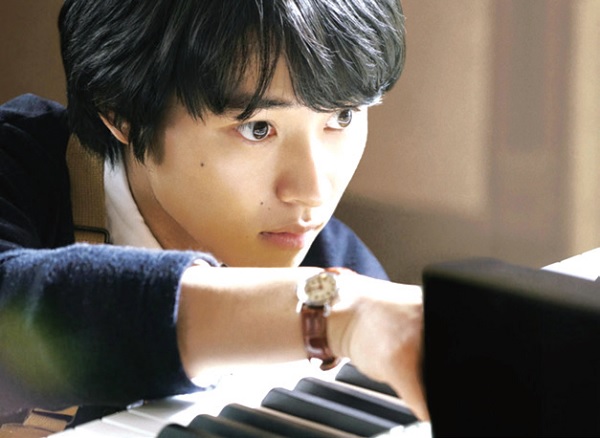Music in the forest
Thoughts after watching the movie "Sheep and the Forest of Steel"


Wool felt and steel strings
"I smell the forest. The smell of the leaves in the forest."
This is an impression that Tomura, the protagonist of the movie "Forest of Sheep and Steel", adapted from Miyashita Naito's novel of the same name, heard the sound of a piano in the school gymnasium.
The sound comes from a wooden hammer wrapped in wool felt hitting the steel strings. The movie tells the story of a young tuner, Waicun, who steps into the forest of sheep and steel without hesitation to explore the scenery and human feelings in the sound of the piano.
Tuners are different from pianists. Facing black and white keys, they may not be able to play a complete piece of music, but they must be familiar with each key and understand the relationship between each hammer and the steel string. The piano is both a stringed instrument and a percussion instrument. Its sound can be gentle or strong, combining the softness of wool felt and the hardness of steel strings. The tuner's job is to find balance between conflicts and find harmony among contradictions; the tuner's mission is to let the wool felt and steel strings express their respective strengths, allowing the pianist to interpret the artistry of the music with precise intonation. , making the encounter between piano and piano player a good story.
In the Kingdom of God, we are sometimes like tuners, entrusted with the role of "perfector." We offer the "best" and use the sacred attitude of Levites to sacrifice, plan in detail, arrange carefully, and practice every link; on the other hand, we also need to have the softness and conformability of wool felt. How much room for flexible adjustment is allowed in the face of co-workers’ personalities and traits? In the face of human weakness and the failure of plans to keep up with changes, how much consideration and persistence should we have? The planning and arrangement of ministry is never just to have a flawless and absolutely pitched "result". We value the building of "relationships" - the relationship between co-workers and the relationship between individuals and God. A perfecter must also be a connector of relationships, just like a tuner who connects the characteristics of wool felt and steel strings, connects the personality of "piano" and "player", and connects the emotions of "music" and "listener".

observer, guide, companion
Tomura comes from a mountain village in Hokkaido. The scenery of every plant and tree in the forest is deeply imprinted on the growth rings of his memory, but it cannot cause any ripples. It wasn't until I met the piano that I realized that there were all kinds of beautiful things surrounding me. He has the keen observation ability cultivated by nature, and has a pair of clear eyes of the soul, which can see the scenery in the sound of the piano. When he began to pay attention to the things around him, the things that had stayed in his memory in the past were redefined as beautiful.
Are you and I an "observer", paying attention to God's creation and experiencing His love and care for us? Do you also have keen spiritual senses and always pay attention to the operation of the Holy Spirit in this generation and people's hearts? Faced with the overwhelming amount of online information every day, what do you see? What do you hear in every Sunday worship, fellowship meeting, and group sharing? Do you interpret everything around you from a spiritual height that transcends reality, or do you follow what others say and follow the trend?
After graduating from training school, Tomura began working at "Eto Musical Instruments Store". Because I feel that I grew up in a mountain with "nothing", I have never been exposed to classical music, and I don't know how to play the piano at all, so I am always trembling on the road of learning. He carried a notebook and pen with him, observing every move of his predecessors step by step, and eager to learn, he recorded every word they said and every detail of their work verbatim.

(https://goo.gl/images/38SLNz)
"How can I tune it well? What kind of tone is the tuner after?" After a tuning failure, Tomura returned to the piano shop in disgrace and asked Mr. Itadori the question.
Mr. Itadori, the gentle and elegant man who initially led him into the field of tuning, was a master figure who made the outside village "high mountains in admiration". He told Waimura: "Don't worry. Be down-to-earth and take it step by step." Then he gave him his usual tuning mallet, saying it was a "congratulatory gift." The flattered Tomura asked: "Congratulations for what?" Mr. Itadori smiled and said: "Things worthy of congratulations will definitely happen next. Congratulations in advance are okay!"
The mixing mallet is the mixer's "eating tool", just like a chef has his own kitchen knife. Mr. Itadori gave the tuning mallet to other villages, not only as an encouragement, but also as a legacy. Before Waimura discovered his potential and characteristics, Mr. Itadori had already seen the beauty of rough jade and was willing to give Shitou a chance.
Have we ever met a spiritual director with such vision, who can see the qualities contained in this rough stone, and is willing to spend time and effort cutting and polishing it so that life can shine? Or, do we also have such warm eyes to look at the younger generations around us who are inexperienced and spiritually immature? Are we "supporters"?
Brother Liu, who is as friendly as an elder brother, is another example of how life affects life. He took Waicun to the customer's home to observe and give him the opportunity to tune the music himself. Brother Liu's advice to other villages is - don't be so step-by-step, just hold your chest high.
Brother Liu encouraged Waicun to try boldly and come face to face with the piano. He believed that only through continuous practice and discipline can one accumulate experience and improve one's skills. Brother Liu also has confidence in Waicun. He believes that as long as Waicun is given a chance and is not afraid of making mistakes, he can shine his own light.
During the spiritual journey, one also needs the companionship and protection of a life mentor. They are the street lights and compass in the coordinates of life, illuminating the way forward and guiding the direction. They see the potential and uniqueness of life with spiritual eyes. And after you and I receive the favor from the "noble person", are we also willing to become others' companions?

Play your own music
In addition to practicing his skills, Tomura is also pursuing the true meaning of becoming a tuner.
After observing, operating, failing, reflecting, and trying again... Waicun finally realized: "I have always known the original scenery of the piano deep in my heart." He has a unique spiritual talent, but he feels hesitant about life. Targeting Waicun, accompanied by his seniors, he gradually found his way to the piano forest, and determined to become a "bridge-building magpie" and "must let the sound reach everyone's ears." Unknowingly, he connected It connects the piano and the player, and completes the scenery in the player's heart.
Twin sisters Heyin and Youren, who have very different playing styles and personalities, admire each other's piano skills. It's a pity that the younger sister Youren, who has always been very talented, has a strange disease and can't move her hands in front of the piano. I feel sorry for my sister's harmony, so I don't want to play the piano anymore.
Sister Youren, who finally recovered, is determined to pursue a career as a tuner. She is also delighted to learn that her sister Heyin has been entrusted by Brother Liu to perform at his wedding banquet.
Brother Liu entrusted the responsibility of tuning to Waicun. Before the wedding banquet began, Waicun tried his best to adjust the piano to the most suitable tone for playing harmony, but found that the sound of the piano became muddy and unclear due to the clutter of waiters coming in and out and the noise of tableware clashing. He was suddenly in a fog.
At this moment, he recalled what he had learned in the past, and also recalled the thrill when he heard the sound of the piano for the first time. As my late grandmother once said: "Children who like the forest will definitely go home by themselves even if they get lost."
He decided to re-tune the tune. With Heyin's trust and Youren's support, Waicun walked steadily through the forest of 88 wool felt hammers and 88 steel strings with gentleness and perseverance. Finally, the fog cleared, and he found the towering tree in the middle of the forest, with the sun shining brightly above it.
In the kingdom of God, everyone can find the goal of "being a willing servant throughout his life" and then become a "doer", living and dying for it. "Forest of Sheep and Steel" euphemistically sings a song of growth for a young tuner: Because he loves the sound of the piano, even though he knows nothing about piano or music, he still devotes himself without hesitation and finds his own voice in the stumbling learning process. Positioning and mission.
Maybe you and I are not clear about our position in service and are not sure what gifts we have; in the process of searching, we may be lost and confused. The source of light is always there. Even if they stumble and even go astray, the Lord's children will not be lost forever; they will surely be able to play their own music in the forest of life and become a beautiful scenery in the kingdom of God.
Note:Original Traditional Chinese translation, 193 pages.
Zien, I write compositions when I am young, and I write articles when I grow up. I used to write for myself, but now I hand the pen over to God. Cooking words to quench hunger cannot bring real spiritual satiety, but I would like to contribute five loaves and two fishes and bake word cookies to "appetite" readers, and then be willing to come into contact with the truth of faith and taste the taste of the Lord's grace.
